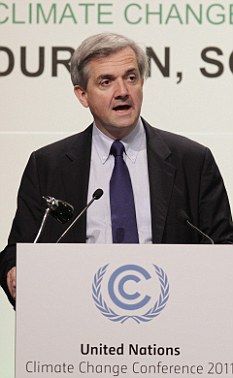|
Back to News
Home
|
> Countries agreed to a 'watered-down' legal agreement to cut emissions
> It will cost some £64billion - £6billion of the bill will be footed by the UK
> Huhne hailed the agreement but environmental groups said it
wasn't enough
Countries agreed to a deal on 11 Dec 2011 to push for a new climate treaty,
which will cut emissions in poorer countries, costing British taxpayers
£6billion. Energy Secretary Chris Huhne hailed the £64billion deal as a
‘significant step forward’ which would deliver a global, overarching legal
agreement to cut emissions.
 But
environmental groups said negotiators had failed to show the ambition necessary
to cut emissions by levels that would limit global temperature rises to no more
than 2C and avoid ‘dangerous’ climate change. But
environmental groups said negotiators had failed to show the ambition necessary
to cut emissions by levels that would limit global temperature rises to no more
than 2C and avoid ‘dangerous’ climate change.
Britain and the EU had come to the talks in Durban, South Africa, wanting the
world’s biggest polluters – the U.S., China and India – to agree for the first
time to ‘legally binding’ caps as they account for nearly half the world’s
emissions.
The treaty, which was to cover all major emitters, would be agreed upon in
return for the bloc signing up to a second period of emissions cuts under the
existing Kyoto climate deal.
But in a surprise move yesterday evening, options for the new legal deal had
been watered down to add a ‘legal outcome.’
European ministers warned they could not accept the weakened deal, but India led
the countries pushing for it, claiming they could not sign up to negotiate a
legally-binding deal without knowing what would be in it or if it would be fair
to poorer countries.
The deal was reached after the South African president of the talks urged the EU
and India to go ‘into a huddle’ in the middle of the conference hall in the
early hours of this morning, in a bid to work out language both sides were happy
with.
A compromise saw the EU and Indians agree to a road map which commits countries
to negotiating a protocol, another legal instrument or an ‘agreed outcome with
legal force’.
The treaty will be negotiated by 2015 and coming into force from 2020.
The deal also lays the ground to address the ‘emissions gap’ between the
voluntary emissions cuts countries have already pledged and the reductions
experts say are needed to effectively tackle climate change.
Mr Huhne, who had warned the meeting ‘may go pear-shaped’, insisted the
agreement on the legal language was not ‘a fudge’ and said that while the EU had
not secured everything it wanted from the talks, it was a great diplomatic
success for the bloc.
It sends a strong signal to businesses and investors about moving to a low
carbon economy, he added.
He said: ‘What we have got is a very significant step forward because we've got
a road map leading to a global overarching legal agreement, which is exactly
what we wanted, we've got a timeline on it.
‘And we've got a very clear process for dealing with the emissions gap in the
interim.’
The Green Climate Fund is set to cost Britain £1billion a year, or £6billion by
2020, to fund solar panels, flood defences and technology.
It was agreed two years ago, but talks this year have focused on how it will be
funded, as countries grapple with low growth and cuts.
Britain has already committed £1billion since 2009 to climate aid through the
Fast Start Programme and has committed to spending £3.4billion by 2015.
But Mr Huhne has pledged ‘support’ for the Green Climate Fund – also backed by
U.S. Secretary of State Hillary Clinton – if it becomes operational during this
parliament.
Since 1997 when the Kyoto Protocol was signed by developed countries, China has
become the world’s largest polluter – accounting for 25 per cent of greenhouse
gases.
Previous talks in Copenhagen in 2009 collapsed in bitter recriminations over
this point but last night the U.S. and China, as well as Canada and Brazil,
signalled they may agree this time.
‘By acknowledging that current emissions targets are inadequate and must be
raised, and by re-establishing the goal of a legal treaty, this agreement should
help build such confidence,’ said Michael Jacobs, a climate change expert from
LSE.
Still environmental groups criticised the deal for a lack of ambition in cutting
the greenhouse gas emissions which drive global warming.
Keith Allott, Head of Climate Change at WWF-UK, said: ‘Governments have salvaged
a path forward for negotiations, but we must be under no illusion - the outcome
of Durban leaves us with the prospect of being legally bound to a world of 4C
warming.
‘This would be catastrophic for people and the natural world. Governments have
spent crucial days focused on a handful of specific words in the negotiating
text, but have paid little heed to repeated warnings from the scientific
community that much stronger, urgent action is needed to cut emissions.’
|
|


![]()
![]()
![]()
![]()
![]()
![]()
![]()

 But
environmental groups said negotiators had failed to show the ambition necessary
to cut emissions by levels that would limit global temperature rises to no more
than 2C and avoid ‘dangerous’ climate change.
But
environmental groups said negotiators had failed to show the ambition necessary
to cut emissions by levels that would limit global temperature rises to no more
than 2C and avoid ‘dangerous’ climate change.